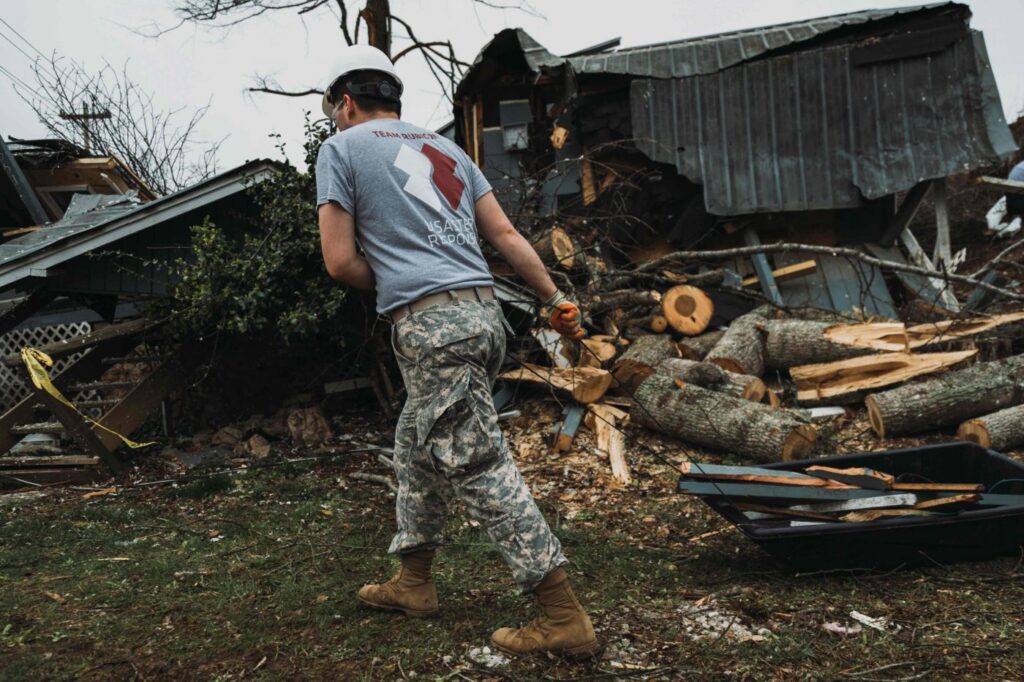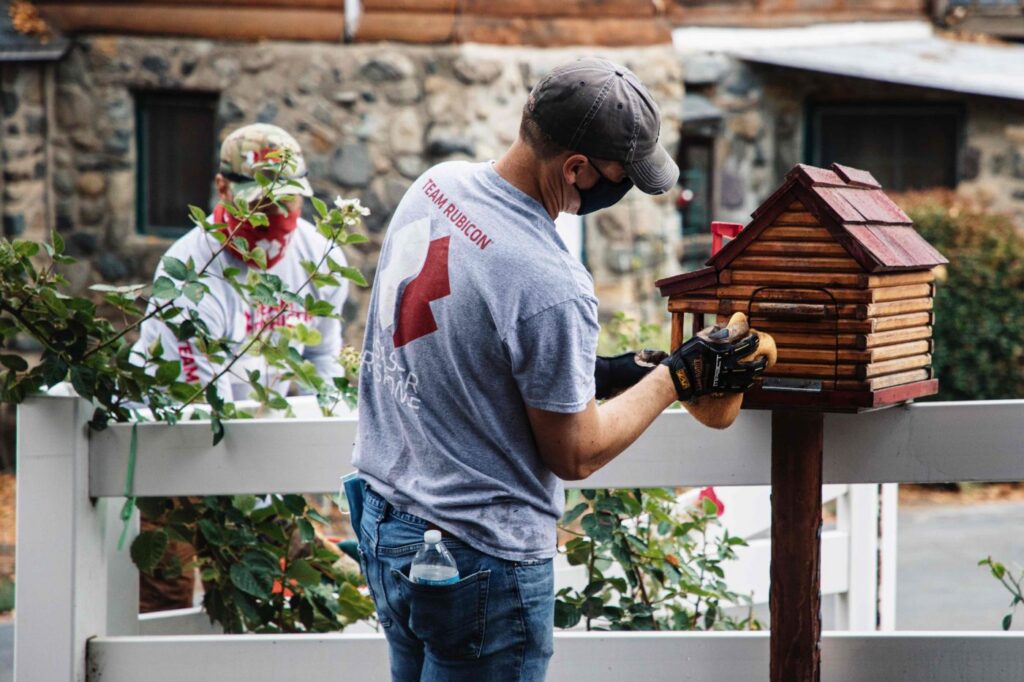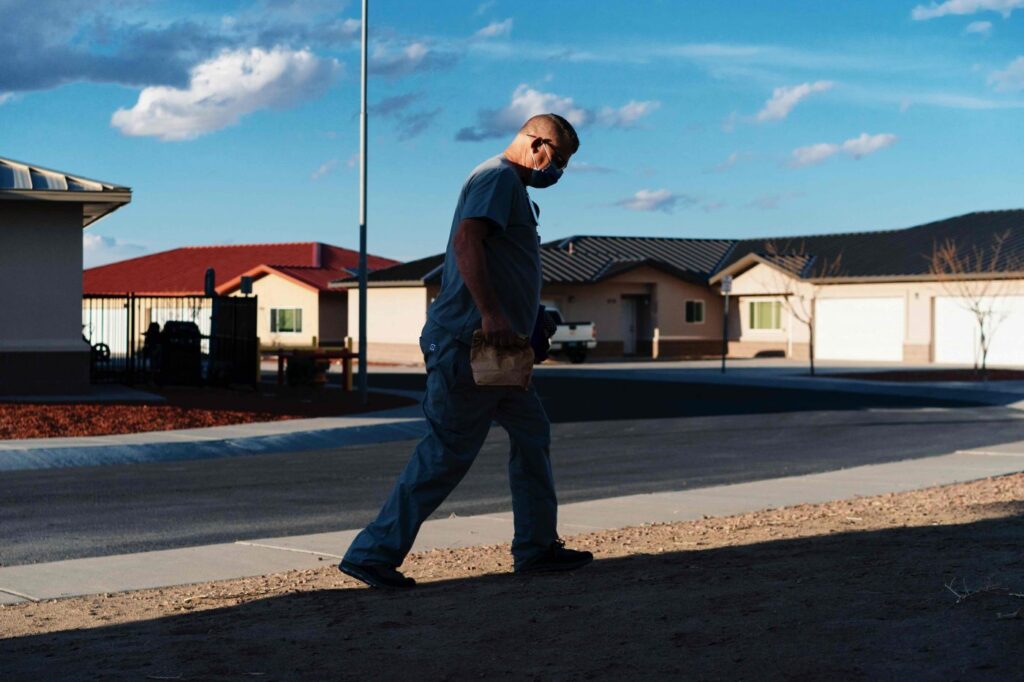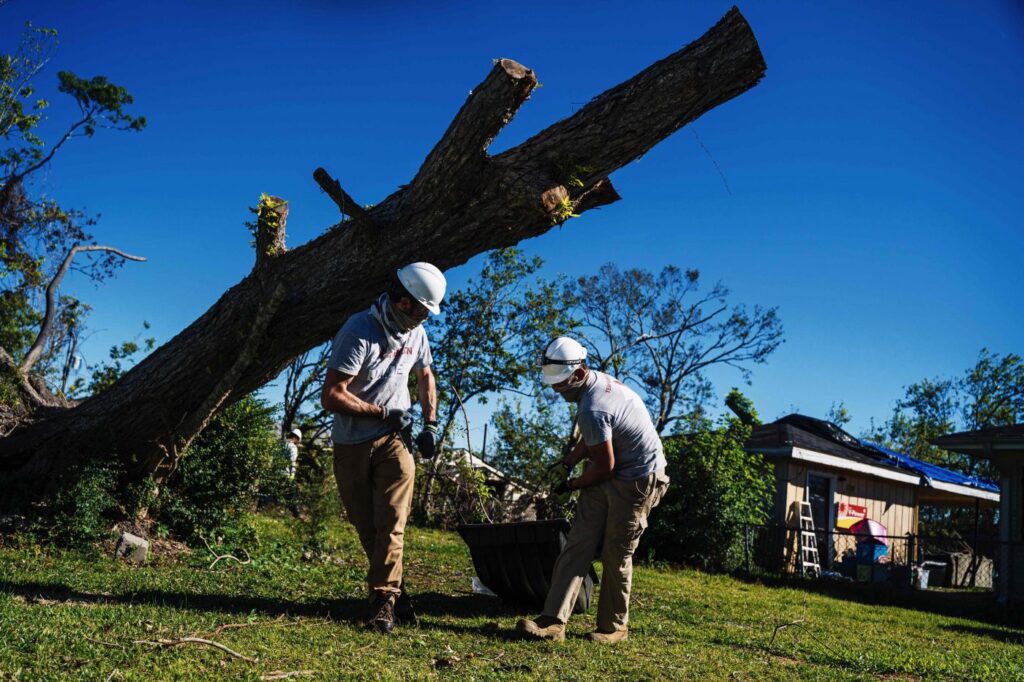No one could have guessed what was in store as Team Rubicon closed out 2019 in historic fashion. Not quite a decade in, the nonprofit had executed a stunning 101 operations in 2019, up 11 from 2018 and more than two-and-a-half times what it had done five years prior. The veteran-led disaster relief operation was readying to celebrate its 10-year anniversary, with the intention of getting even more done in 2020 than ever before.
Of course, what Team Rubicon didn’t see coming was the pandemic. But then, it also didn’t expect to begin to providing medical services domestically, either. Or, for America to experience one of the worst years of natural disasters on record—16 billion-dollar disasters versus the average of seven. Or, that Team Rubicon’s volunteers, known as Greyshirts, would soon be delivering disaster relief to hurricane survivors in the middle of a pandemic.
And yet, it did all that and more. Over the course of one year—and largely, over the course of the 10 months in the pandemic—3,430 Greyshirts served on more than 12,500 deployments and assisted more than 9.7 million individuals. All in the middle of the pandemic, and amidst an expanded set of operations. Mucking out houses after a tornado turned into standing up COVID-19 testing sites, serving in hospitals and on ambulances at the Navajo Nation, and tarping hundreds of roofs for hurricane survivors in the Gulf Coast. Here’s how Team Rubicon spent 2020.
Staunching the Floods of February
It’s early winter in the U.S., and flooding is happening across the country.
Back in 2018, Hurricane Florence spread her wrath, resulting in $45 billion in damages to thousands of homes across the eastern coast of North Carolina. Team Rubicon had responded, helping nearly 250 homeowners, but then, came Hurricane Dorian in the fall of 2019, and many homes affected by Florence were further damaged. So, in early February, Greyshirts deployed on Operation Tarheel Spirit where they assisted in ongoing flood recovery efforts, and provided muck-out and general debris removal to affected communities in coordination with local and state authorities.
Meanwhile, more than 4.5 inches of rain fell in Southeast Kentucky in early February, too, flooding homes and inundating roads in Harlan, Bell, Knox, and Whitley counties. The American Red Cross opened shelters for survivors being evacuated. By February 18, with the floods receding, 20 Greyshirts hit the ground as part of Operation Wilderness Road, where they spent a long weekend mucking houses and removing debris in order to get survivors back in their homes.
Around the same time, Greyshirts began deploying in response to floods on the other side of the country. When two levies breached in Washington state, Whatcom County, along the border with Canada, found itself in need of assistance. As rivers such as the Nooksack, Stillaguamish, Snohomish, Snoqualmie, Skagit, Skokomish, and Skykomish rose to flood stage, 10 major highways closed due to flooding, landslides and erosion, and multiple towns faced flooding.
As the waters began to recede, Team Rubicon launched Operation Noisy Waters, deploying nearly 60 Greyshirts over the course of a week who mucked out homes and cleared communities of debris left by the floods. And, a few hundred miles to the south, Greyshirts were deploying to Pendleton, OR in response to major flooding. This became Operation Let’r Muck, and over the course of about two weeks, 66 Greyshirts mucked out flooded homes and removed nearly 24,000 cubic feet of flood debris.
Tornadoes Don’t Stop for Pandemic (and Neither Do Greyshirts)
Even as COVID-19 was beginning to creep across the U.S., tornadoes were spinning in the American Southeast.
On February 6, 2020, a severe weather system moved through the southeast territory producing multiple tornadoes, wind damage and flash flooding in Spartanburg and Cherokee Counties, SC. Soon reports of extensive damage were trickling in from throughout the area.
On February 11, the Southeast Territory began mobilizing Greyshirts to Spartanburg, SC. Over the course of a week, more than 40 Greyshirts assisted in tornado recovery efforts, clearing nearly 20 yards and moving more than 1,250 tons of debris.

Severe storms swept through Tennessee in early March, bringing with them multiple tornadoes, including an EF-4 in Putnam County with 175 mph wind speeds that, over its 8-mile course, damaged or destroyed dozens of homes and businesses, killed 19 people, and injured 88 others. Two days later, 55 Team Rubicon volunteers were en route to the area as part of as part of Operation Awesome Eagle, bringing sawing and mucking skills with, to cut through downed branches and felled damage and remove debris strewn across roads and homes. Over the course of two weeks, 55 Greyshirts tarped roofs, sawed downed trees, and removed more than 2,400 cubic yards of debris.
Then, in April, the coronavirus was in full pandemic stage and Team Rubicon had begun looking for more ways to serve. Just one week after identifying Louisiana’s Ouachita Parish as a potential for coronavirus health and medical assistance, three tornadoes tore through the community and Team Rubicon delivered sawyers instead.
In all, Team Rubicon responded to different 10 tornadoes during 2020—all within the COVID environment.
With National Deployments on Pause, Team Rubicon Launches #NeighborsHelpingNeighbors
With the pandemic in full swing, Team Rubicon knew it had to find a way to protect Greyshirts while still serving Americans in need. Early on, the organization had begun adhering to age-restrictions set by the CDC, and finding ways to implement PPE protocols and enforce social distancing practices on all operations. For a time, Team Rubicon chose to only deploy Greyshirts to local and regional operations, eliminating the need for air travel and billeting.
Recognizing that Greyshirts are built to serve, Team Rubicon launched its Neighbors Helping Neighbors initiative in March. Instead of putting Greyshirts on airplanes, Team Rubicon would enable them to help within their own communities, instead. Soon, Greyshirts were building little free pantries and stocking them with emergency food and supplies, sewing masks and delivering PPE to first responders, checking on their neighbors, mowing lawns for those sequestered at home, and much more.

The program stuck, and as the pandemic continued on, Greyshirts across America found more and more ways to help their neighbors. By December 22, more than 10,100 acts of community service had been completed by Greyshirts through the Neighbors Helping Neighbors program.
A Novel Capability for a Novel Virus: Team Rubicon Stands Up COVID-19 Testing Sites
While the #NeighboirsHelpingNeighbors iniative was a start, Team Rubicon wanted to do more. So, it began addressing how it might deliver medical assistance, too. Among the first new capabilities the organization delivered was standing up coronavirus testing sites.
On April 4, the first people rolled through a COVID-19 mobile testing site at Atrium Health in Charlotte, North Carolina. Between April and July, the Atrium Health testing site conducted 8,747 tests for COVID-19 and screened 9,344 people for the virus.
Meanwhile, across the country Team Rubicon was helping stand up and run COVID-19 testing sites in Los Angeles. Through a partnership with Verily Life Sciences, Team Rubicon launched five fixed testing task forces and seven mobile testing task forces. By the time the partnership concluded in November it had supported the testing of more than 103,000 people across 50 locations.
Field Hospitals in California, Medics at the Navajo Nation
While Team Rubicon had become the first NGO in North America to receive the World Health Organization’s Emergency Medical Team Type 1 certification in June of 2018, the organization’s medical capabilities had always been focused exclusively on international operations. The COVID-19 pandemic changed all of that, and soon Team Rubicon was standing up field medical hospitals and deploying nurses and doctors to one of the hardest hit areas of the U.S.
On April 4, Team Rubicon stood up its first field medical hospital in California. Located in the Santa Clara Convention Center, the field medical hospital was the place where low acuity patients—people whose COVID-19 symptoms were declining and who were no longer in need of the most intensive coronavirus care—could continue their recovery before returning home. For the Santa Clara hospital system, it was a resource that allowed them to free up beds for, and focus attention on, people in need of the most critical care.
With days, Greyshirt medics were headed to the Navajo Nation, too.
At about 27,000 square miles, and spanning parts of New Mexico, Arizona, and Utah, the Navajo Nation is the largest Native American reservation in the U.S. With more than 300,000 enrolled tribal members, the tribe is also the second largest in the country, behind the Cherokee tribe. It is also home to a proud contingent of veterans, with approximately 12,000 veterans among its ranks.

That massive size and dedication to country didn’t spare the Navajo Nation from the coronavirus pandemic. In May, it had the highest per-capita COVID-19 rate in the U.S., and the Navajo people were experiencing unimaginable losses.
In mid-April, Team Rubicon began deploying Greyshirts to the Navajo Nation. Over the course of 90 days, 128 Greyshirts—including 47 medical volunteers—spent more than 15,000 hours volunteering at the Navajo Nation and served more than 3,000 patients.
Then, in December, Team Rubicon volunteers returned to the Navajo Nation where they are assisting Indian Health Services—and where one Greyshirt nurse helped administer the first COVID-19 vaccines.
Lapping the Earth to Feed Americans in Need
As Americans began getting tested for the coronavirus, a hunger epidemic was also surging across the country. So, on April 15, Team Rubicon partnered with Feeding America to enable Greyshirts to volunteer in place. Combining Feeding America’s infrastructure of member food banks with Team Rubicon’s nationwide cadre of Greyshirts could help battle the threat of widespread hunger.
Through the partnership, Team Rubicon deployed Greyshirts across Feeding America’s nation-wide network of food banks and agencies to help sort, pack, and distribute more than 48 million pounds of food. Over the course of seven months, nearly 2.73 million meals were served, more than 9.7 million meals were packaged for distribution, and Greyshirts drove some 122,300 miles—the equivalent of lapping the earth more than four times—to deliver meals to Americans in need.
Finding a Way to Deliver Food to Those Most at Risk
Yet while some Americans might have been able to access food banks, people at the highest risk of COVID-19—especially those immunocompromised due to other conditions—faced a dilemma: the mere act of leaving home to get food could put them in danger.
To address this, Team Rubicon launched an expansion of the #NeighborsHelpingNeighbors campaign, the Emergency Food Assistance Program, on May 8. A collaboration between Team Rubicon and Patient Advocate Foundation, powered by the Bristol Myers Squibb Foundation, EFAP would provide emergency food delivery and financial assistance to patients with cancer, multiple sclerosis or rheumatoid arthritis. BMSF provided the funding, PAF would manage and distribute grants, and Team Rubicon’s Greyshirts would deliver groceries to the doorsteps of people in need.
Initially designed to last just a couple of months, EFAP was extended in early summer. By the time funding ran out and EFAP ended on October 8, 22,942 financial grants had been provided in all 50 states and territories and Greyshirts had delivered food resources to more than 2,700 patients.
Historic Hurricane Season, and a Historic Response
Even Mother Nature wouldn’t heed the coronavirus pandemic. Within two days of the start of hurricane season, the third named storm had already been christened. Tropical Storm Cristobal—formed from the remnants of Tropical Storm Amanda in the Eastern Pacific—churned through the Gulf of Mexico before making landfall over southeast Louisiana on June 7.
Cristobal was just the beginning of what became the historically violent 2020 Atlantic hurricane season. Between June and December, six hurricanes hit the U.S., including three that made landfall in Louisiana, causing devastation in coastal communities from Texas to Florida. On August 27, Hurricane Laura made landfall as a Category 4 in Calcasieu Parish, LA. Less than three weeks later, Hurricane Sally made landfall at Gulf Shores, AL. Then, Louisiana took the brunt of two Category 2 Hurricanes: On October 9, Delta made landfall just miles from where Laura had; on October 28, Zeta made landfall at Cocodrie, near New Orleans.
Within two days of Laura’s landfall, Team Rubicon had launched the first of its national responses to natural disasters since the pandemic. Operation Crying Eagle would serve residents of Calcasieu Parish and Orange, TX effected by Hurricane Laura and later by Hurricane Delta. Then, on September 18, Team Rubicon launched Damn the Torpedoes to serve residents of Baldwin County, AL and Escambia County, FL affected by Hurricanes Sally and Zeta.

With aid organizations across the U.S. hamstrung by COVID-19, Crying Eagle was a massive and successful response. Over the course of two months, 613 Greyshirts assisted more than 809 individuals and worked on 405 homes in Calcasieu Parish, and 368 Greyshirts assisted 479 individuals and worked on 216 homes in Orange, TX.
Meanwhile, more than 270 Greyshirts deployed to Alabama and Florida for Damn the Torpedoes, where they worked on 291 homes and assisted more than 584 individuals.
Of course, this hurricane season was unrelenting, but so were Greyshirts. After two Category 4 Hurricanes—Eta and Iota—made landfall in Central America on November 3 and 17, respectively, Team Rubicon worked with officials and local agencies in Honduras and local partners to conduct a water, sanitation, and hygiene program, or WASH, providing clean water for affected communities. By the operation’s conclusion on December 15 Greyshirts had helped 560 families in Honduras receive clean drinking water.
In Other Regions, Other Disasters
Not all of Team Rubicon’s natural disaster responses during the pandemic were in the Southeast. In August, a derecho and severe thunderstorm front moved across the Midwest, impacting areas from Iowa across northern Illinois and southern Wisconsin, and taking down cell towers and electrical grids, and leaving roadways blocked by downed trees and power lines.
In response, Team Rubicon Midwest Territory deployed more than two dozen Greyshirts to Leyden County, IL, on August 13 where, over the course of a long weekend, they removed fallen trees and massive amounts of wind debris from homes and yards. Then, the Midwest Territory pivoted to Iowa, for a six-week continued response in Cedar Rapids, followed by a four-day response in November.
Out west, Greyshirts were looking for ways to respond to a historic wildfire season, too. This summer, Greyshirts in Niland, CA conducted sawyer work and debris removal using heavy equipment after wildfires impacted the area, removing more than 4,000 tons of debris and saving the community and estimated $1.6 million in recovery costs.
Rebuild Redux
If Mother Nature wasn’t up for being done with the American Southeast, neither was Team Rubicon. On December 1, the organization announced Gulf Coast Rebuild, a major expansion of the Rebuild program first launched in Houston in response to Hurricane Harvey. Gulf Coast Rebuild has committed to helping rebuild homes devastated by Hurricanes Laura and Delta, therein providing continuity of service to shorten the time it takes to get homeowners back into their houses. To date, Rebuild has completed 108 homes in Houston and the newly launched Gulf Coast Rebuild has completed and moved families back into two homes.
Going into 2020 no one could have begun to imagine the pandemic, that’s a given. But even more, no one at Team Rubicon could have imagined that the organization would close the year having launched multiple new services—including COVID-19 testing support, medical support, and feeding operations. Or that Greyshirts would see more than 4,000 patients, help administer more than 100,000 COVID-19 tests, work on nearly 1,000 hurricane-damaged homes and help more than 9.7 million Americans, all in the course of one year.



